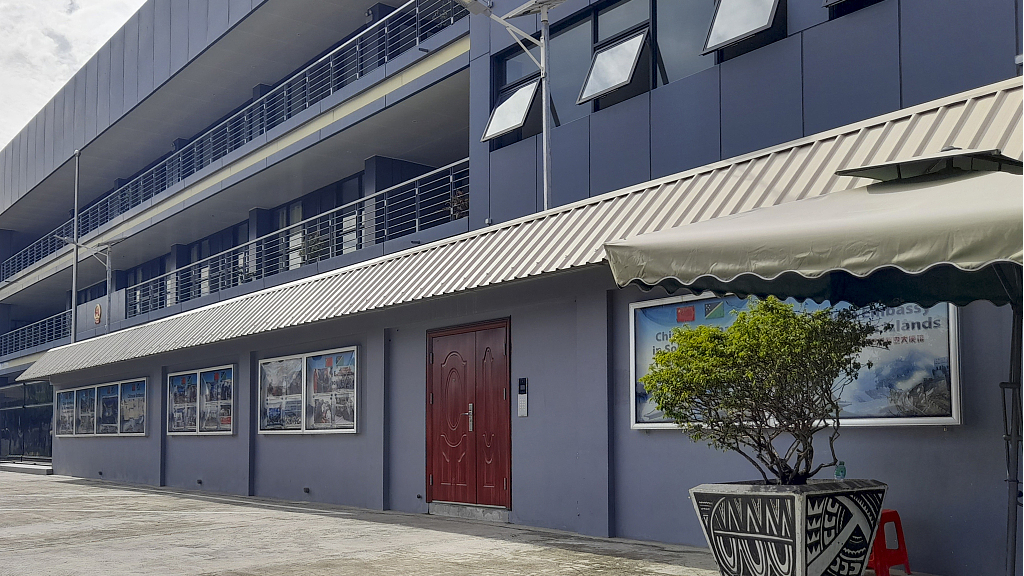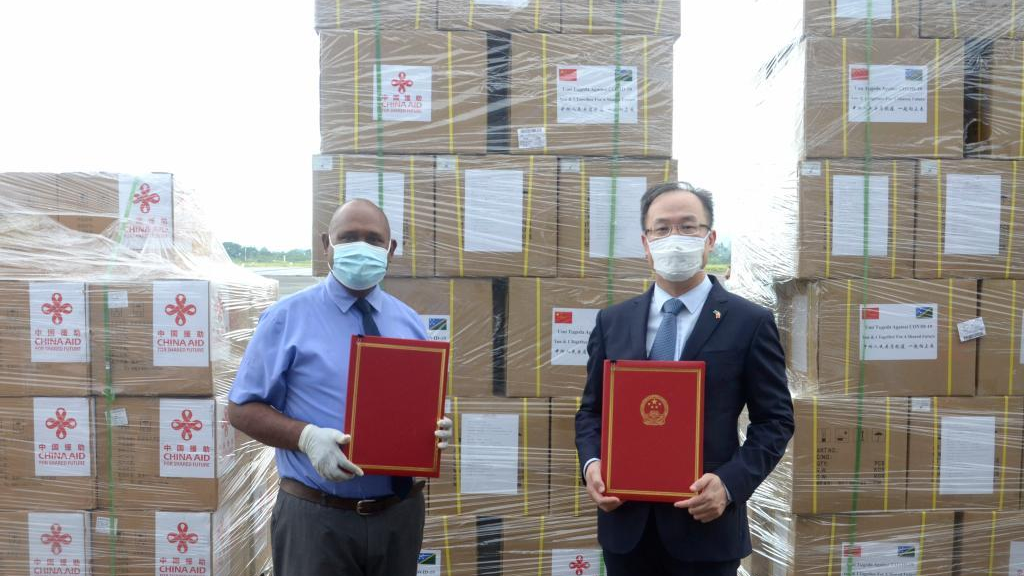
The Chinese Embassy in Honiara, Solomon Islands, April 2, 2022. /CFP
The Chinese Embassy in Honiara, Solomon Islands, April 2, 2022. /CFP
Editor's note: Andrew Korybko is a Moscow-based American political analyst. The article reflects the author's opinions and not necessarily those of CGTN.
The U.S.-led Western response to the Solomon Islands' recent signing of a security pact with China has drawn some comparisons to Russia's response to the scenario of Ukraine one day joining NATO like both of those two claimed is their official future goal. America and its Australian regional junior partner believe that this South Pacific security agreement poses a latent threat to their national interests the same as Russia regards Ukraine's membership in NATO. That, however, is an imperfect comparison.
Before explaining the differences between those two countries' security situations and those of their regions more broadly, it's important to remember a fundamental principle of international relations. All countries have the right to enter into whatever partnerships they want with anyone else, though they shouldn't be aimed against any third party or at their expense. Whenever such partnerships are perceived that way, it risks triggering what's been described as a security dilemma.
This concept refers to one country or group thereof doing something with a supposedly defensive intent that's nonetheless perceived as a latent threat to another side's security. That second side then takes their own supposedly defensive steps to preemptively ensure their interests, which are in turn perceived as a latent threat to the first side's security. They then react accordingly, which sets into motion a self-sustaining cycle of instability that risks the eventual outbreak of conflict between both sides.
With the principle of indivisible security in mind as well as the associated risk of security dilemmas, one can now better understand the differences between the Solomon Islands and Ukraine. That South Pacific country's new Chinese partner isn't part of any military alliance and doesn't have a history of waging wars of aggression. This importantly differentiates China from Ukraine's NATO partners who bombed Yugoslavia, Afghanistan and Libya, along with destabilizing many others.
Secondly, China's only overseas military base is a naval one in Djibouti that was built to contribute to the regional struggle against piracy, which is a transnational non-state threat. NATO's bases, however, are conventional ones aimed at bolstering its member states' capabilities to shift the balance of power against Russia, whose predecessor state of the Soviet Union was the target of that alliance's containment efforts and the reason behind its creation. To this day, NATO still tries to contain Russia.
Building off of the above contrast, China's security pact with the Solomon Islands will help that country manage internal threats to its security such as the riots that broke out there late last year. This South Pacific state has struggled with such challenges for years, which can contribute to regional instability and refugee crises if they aren't effectively addressed. NATO, meanwhile, has deployed "anti-missile systems" and strike weapons in its members' territory that Russia regards as regionally destabilizing.

Chinese Ambassador to the Solomon Islands Li Ming (R) and Solomon Islands Minister for Health and Medical Services Culwick Togamana pose for a photo in Honiara, capital of the Solomon Islands, February 18, 2022. /Xinhua
Chinese Ambassador to the Solomon Islands Li Ming (R) and Solomon Islands Minister for Health and Medical Services Culwick Togamana pose for a photo in Honiara, capital of the Solomon Islands, February 18, 2022. /Xinhua
The fourth difference is that China isn't trying to carve out a so-called "sphere of influence" anywhere in the world while those countries that have joined NATO since the Soviet Union's dissolution undeniably constitute an American military "sphere of influence" in Europe. This is an important point since soft security cooperation such as that between China and the Solomon Islands doesn't have a credible chance of sparking a security dilemma unlike NATO's conventional security cooperation with Ukraine.
On that topic, there is no realistic reason why anyone would assess that China's mutually beneficial cooperation with the Solomon Islands on tackling non-state threats within its borders and perhaps eventually the broader region constitutes a threat to America, Australia, or anyone else. It doesn't involve "anti-missile systems," strike weapons, or offensive military posturing like NATO's cooperation with its members do and which quite understandably occur at the expense of third parties like Russia.
What's so hypocritical about the U.S.-led Western overreaction to China's security pact with the Solomon Islands is that Washington isn't saying a word about how much more concerning NATO's conventional security cooperation with Ukraine is to Russia. If someone concludes for whatever wrong reason that China's soft security assistance to another country is regionally destabilizing, then it naturally follows that NATO's hard security assistance to Ukraine is even more destabilizing.
What's really happening is that the U.S. and Australia, two of the three countries that comprise the newly formed AUKUS military alliance alongside the UK, are trying to fearmonger about China's speculative long-term military-strategic intentions in order to hegemonically pressure the much smaller Solomon Islands to sacrifice its national security interests in order to revert to becoming their joint vassal state. That South Pacific country has the sovereign right to formulate independent policies, though.
It's not the U.S., Australia, or any other country's place to tell it what to do or what not to do. There aren't any credible reasons to consider China's soft security pact with the Solomon Islands to be a threat, unlike NATO's hard security cooperation with Ukraine. The weaponized misportrayal of this regional security agreement amounts to information warfare against those two countries. As such, it must be universally condemned by all those who support international law and state sovereignty.
(If you want to contribute and have specific expertise, please contact us at opinions@cgtn.com. Follow @thouse_opinions on Twitter to discover the latest commentaries on CGTN Opinion Section.)

